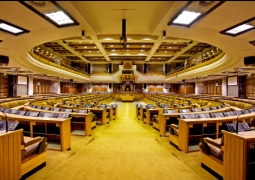
The National Assembly committee sat again today to look at its programme and to keep all political parties abreast of the development with regard to its work. One of the matters that were brought to the attention of members of the committee was that the programme of Parliament has been extended to the end of June than previously indicated. This amendment was due to the disruption caused by the outbreak of the coronavirus pandemic that necessitated Parliament’s temporary closure.
Now that Parliament has resumed its business, it has committed itself to dealing with all matters that were before it or were part of its previous schedule. It was reported to the committee that the Division of Revenue Bill has been passed by both Houses of Parliament and it now awaits President Cyril Ramaphosa’s assent (approval).
The delay in the passing of the Division of Revenue Bill has, in turn, delayed the tabling of the Adjusted Budget by the Minister of Finance to repurpose state funds in the fight against the pandemic. Most of all, to both arrest and cushion the socio-economic impact it has had on our country’s fiscus and society whose rippling effect would last for years to come.
This Bill has been a stumbling block to the National Treasury’s plans to alleviate the negative impact the pandemic has had on the country’s economy and social fabric. In addition to that, to respond to South Africa’s technical recession, recent downgrading by rating agencies, and to reengineer the economy and government expenditure to ensure that government social programmes and the fiscus are not adversely affected by these catastrophic developments.
For instance, some of the relief funds announced by President Ramaphosa to cushion the South African economy and society from the ravages of the pandemic could not be brought into effect because they were not part of the Budget Speech that was tabled by the Minister of Finance before Parliament in February.
The R50 billion stimulus package relief fund allocation to rescue and resuscitate municipalities’ revenues hampered by lockdowns which resulted in the loss of their revenue streams, could not be accessed until the Bill has been passed and assented to by the President.
This R50 billion is aimed at assisting mainly the municipalities which still have a huge infrastructure backlogs of water and sanitation at a time when such amenities are of great necessity, if not a matter of life and death in the fight against the pandemic.
The programme committee has also made an undertaking that there will be a Youth Day Debate and Youth Parliament before Parliament adjourns. This will be done to commemorate our youth’s contribution to our liberation struggle. But also to reflect on its plight currently and to devise ways of unlocking its (youth’s) potential.
There was also a request that Parliament should consider hosting a debate in solidarity with the protests against the brutal murder of George Floyd at the hands of police which caught the world’s imagination. As such, this matter should not be seen as an American problem, but that which resonates with the lived experience of the black body wherever it finds itself on planet Earth.
The case of Collins Khoza, here at home, is a typical example. This debate seeks to bring this lived experience and mindless act of the maiming, mutilation and killing of the black body at the hands of authorities.
The Speaker of the National Assembly (NA), Ms Thandi Modise, conceded that such a request will be looked at because these are incidents which can’t be overlooked.
The matter of the revival of the Ad Hoc Committee on Section 25 of the Constitution came before the committee. Ms Modise undertook to embark on a wide consultation of other key parliamentary role players on the revival of the committee to finalise its work.
This committee was responsible for reaching out to the communities by holding public hearings to determine whether section 25 of the Constitution should be amended to enable the government to appropriate land without compensation. According to the report tabled to the programme committee, the business of this committee is not yet finalised, hence the need to revive it and to give it adequate time to do so. Parliament has to consider that in light of the strains brought to bear by the pandemic.
By Abel Mputing
11 June 2020

